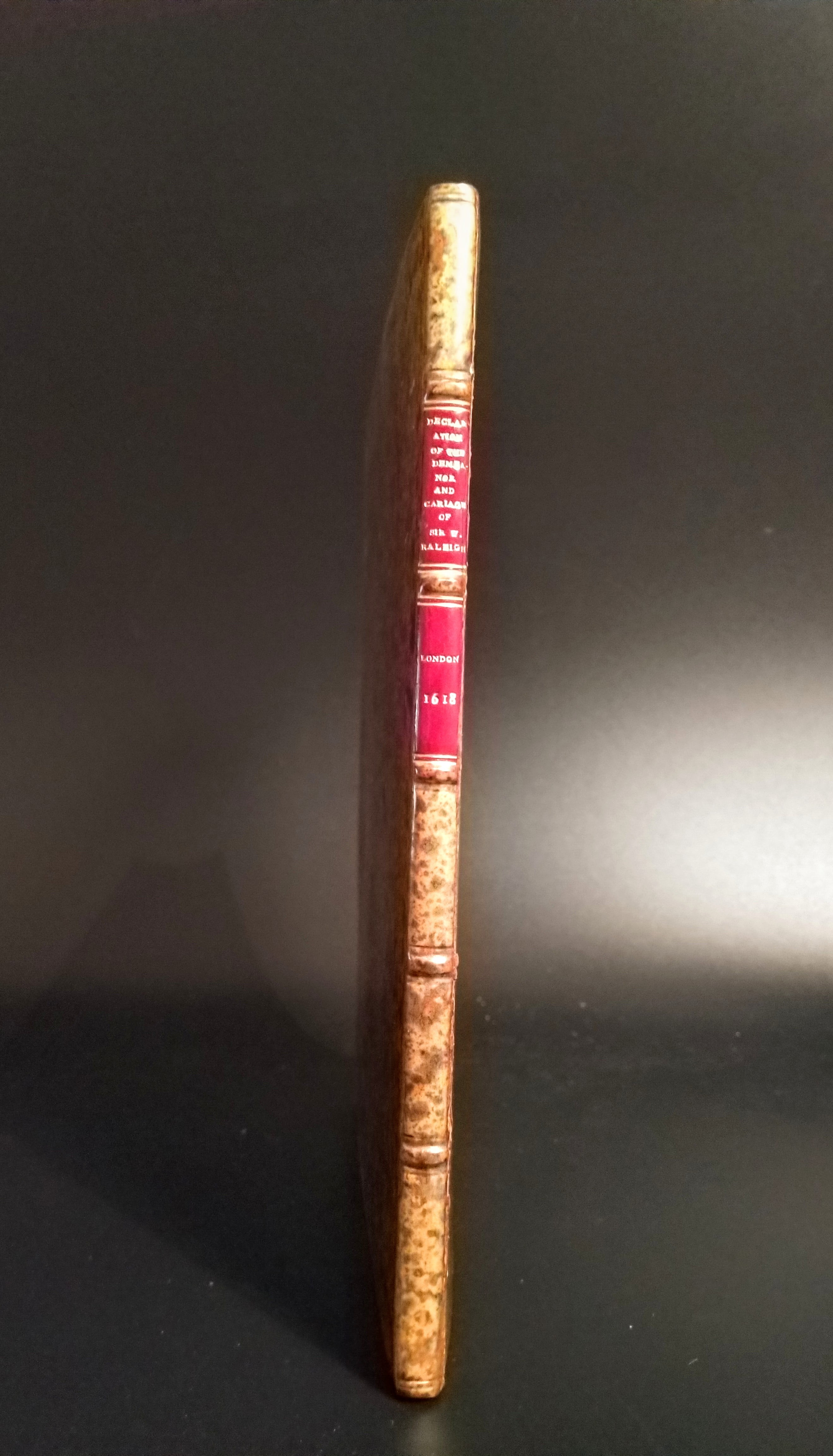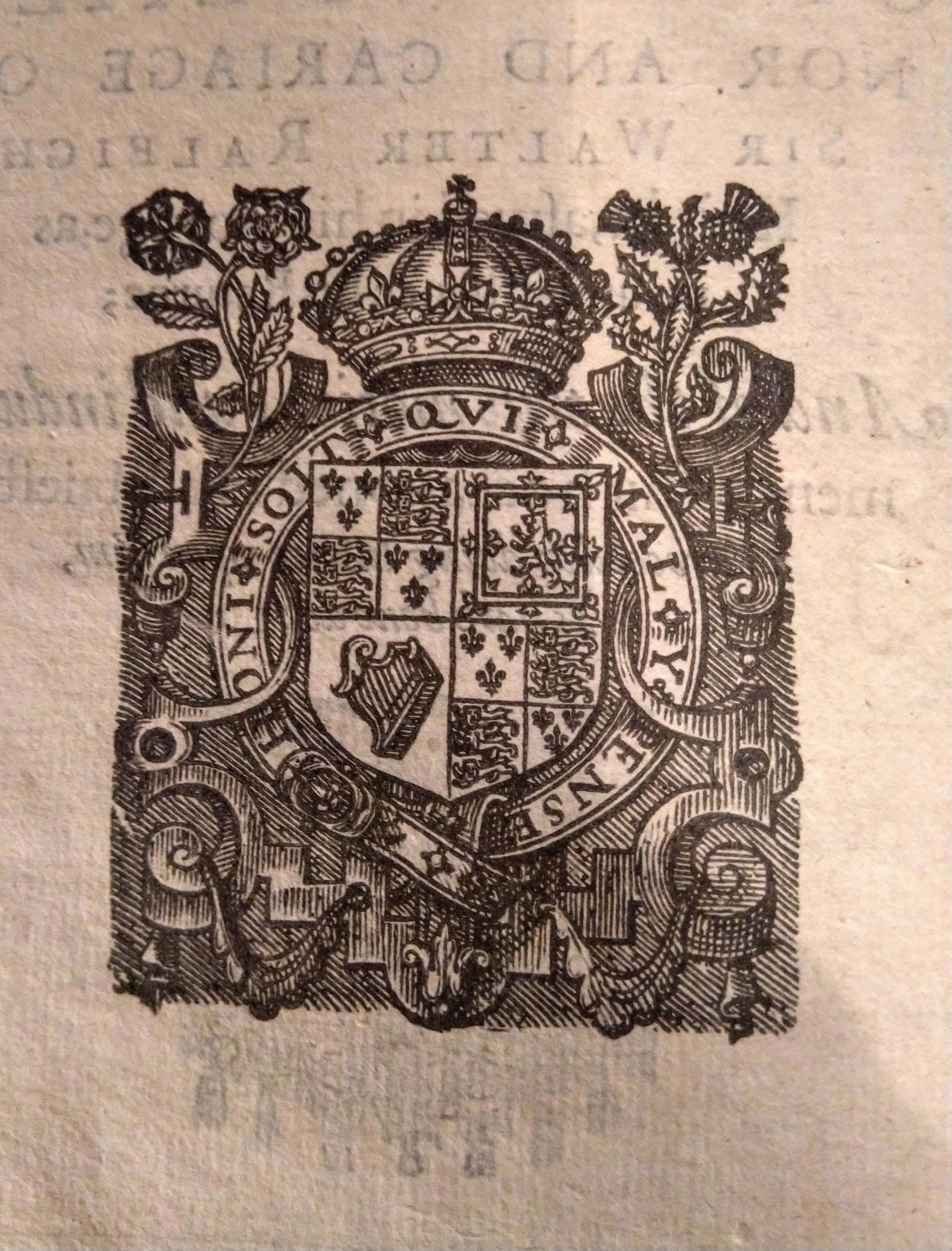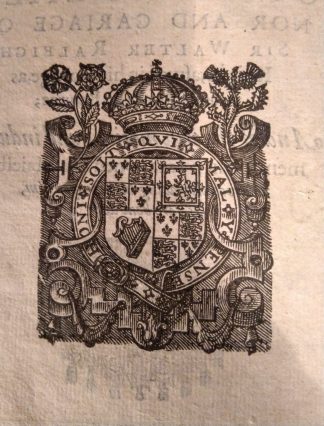RALEIGH, Walter
A Declaration of the Demeanor and Cariage of Sir Walter Raleigh, Knight, as Well in his Voyage as in, and sithence his Returne
London, Bonham Norton, 1618£4,950.00
FIRST EDITION, FIRST ISSUE. 4to.pp. (ii) 63 (i): [superscript pi], A², A-H (lacks initial signed blank). Roman letter, the Royal commission in Italic, woodcut printer’s device (Mckerrow 248) on title, woodcut Royal arms on verso, woodcut initial and headpiece. Title and verso of last dusty, blank lower outer corners a bit soiled, light yellowing occasional marginal mark. A very good, large margined copy in C19th speckled calf by Riviere and Son, covers bordered with a double blind rule, spine with raised bands, red morocco labels gilt, inner dentelles richly gilt.
The exceedingly rare first edition, first issue, of the official apologia for Raleigh’s execution, detailing, just months after the events described, his conduct during his last voyage to America in 1618. It was composed by the commissioners, including Bacon, who tried and condemned Raleigh. After Raleigh failed to locate the source of Spanish treasure he had promised the ever avaricious King James, he captured the island of St. Thomas killing the Spanish governor. On his return Raleigh was tried for this attack, with Bacon as prosecutor. However, as Raleigh was already under sentence of death for his 1603 conviction for supposed treason, he could not be tried for his misdeeds in St. Thomas. James, under pressure from the Spanish Ambassador Don Diego Sarmiento de Acuna, Count Gondomar, ordered Raleigh executed under the 1603 verdict. This volume attempts to justify the execution in the face of public indignation. In a letter to a friend, Bacon wrote: “we have put the Declaration touching Raleigh to press, with his Majesty’s additions which were very material and fit to proceed from his Majesty.” In the account of his final moments Raleigh’s biographer John Shirley notes that as he took his leave of Lord Arundel he “intreated him to desire the King, that no scandalous Writing to defame him might be published after his Death.” Raleigh’s courageous conduct at the scaffold and popular indignation that followed his execution immediately provoked defences by those responsible. The first issue of this work was rushed through the press by the Government (resulting in several variants), as James attempted to face down the public outcry (According to a letter of Sir Robert Naunton’s [Fortesque papers Camden Soc. ..] ‘in theyr haste, [the printer’s] were faine to watche 2 nights and sett 20 presses aworke at once’). Phorzheimer. Bacon began by maintaining it was not the duty of a Sovereign to justify himself to the people, but because of Raleigh’s final speech it was necessary to explain why he deserved execution. The King’s part in Raleigh’s disastrous expedition to Guiana was reconfigured as a magnanimous gesture. He didn’t believe that there was such a ‘City of Gold,’ but because of the popularity of Raleigh and his influence with the people it was deemed necessary to indulge him. The work then publishes the commission given to Raleigh for his Voyage in full, and alleges he betrayed it: “it appeareth plainely, by the whole sequell of his actions, that he went his owne way, and had his owne ends: first, to procure his libertie, and then to make new fortunes for himself, casting abroad onely this tale of the Mine as a lure to get adventurers and followers; having in his eye the Mexico fleete..”. there follows a short account of the voyage and further supposed misdeeds and ends with a detailed account of Raleigh’s return and purported attempts to escape. A hugely interesting and rare contemporary account of Raleigh’s last voyage to the Americas and its fatal consequences.
ESTC S115419. STC 20652.5. Pforzheimer 819 (second issue). Sabin 67548. Church 374. Alden 618/37. JCB II:123In stock














